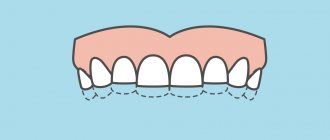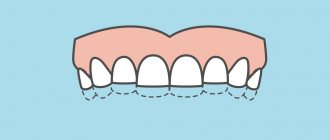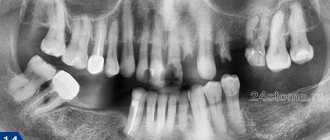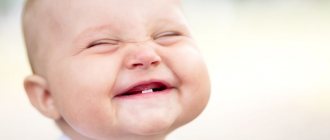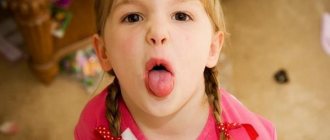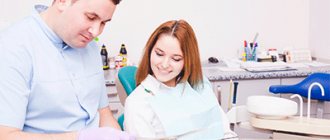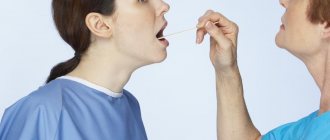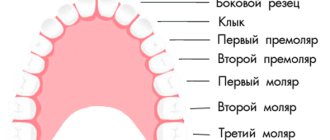Teeth grinding (bruxism) is a common problem in children and a cause of concern for parents. This phenomenon does not apply to diseases. This is a symptom that signals various malfunctions in the endocrine, digestive and nervous systems of the child’s body. Here it is necessary to pay attention to other changes in the child’s behavior. Only a doctor can determine the exact cause after a thorough examination.
In this article we will try to find out why a child may grind his teeth, how dangerous it is, and what to do in this case.
What is bruxism and its manifestations
Bruxism is a pathological condition that occurs due to excessive clenching of the jaws.
By the age of 5 years, teeth grinding occurs in almost 50% of children. This occurs involuntarily and is associated with a spasm of the masticatory muscles. Usually the pathology occurs at night, in attacks of 10-15 seconds. Attacks may recur during the daytime. At the same time, daytime teeth grinding causes more concern for parents, since it is more noticeable.
Reference!
Isolated cases of teeth grinding are not dangerous and do not require intervention. If the attacks become chronic, you need the help of a pediatrician.
In addition to grinding teeth, a child may experience the following manifestations of pathology:
- headache;
- daytime drowsiness, lethargy;
- neck pain;
- tearfulness;
- tooth sensitivity is the result of abrasion and damage to the enamel;
- restless sleep with frequent awakenings;
- congestion in the ears.
Dentists identify a triad of symptoms in childhood bruxism (up to 5 years). These are erosive wear of baby teeth, malocclusion and narrowing of the dental arches. Teeth grinding usually goes away on its own when a child reaches puberty. Teeth grinding is a rare occurrence among teenagers and young adults.
Important diagnostics
Modern diagnostic methods make it possible to identify almost all types of parasites. However, cases of infection often remain unsolved. Usually patients do not even think that they could be attacked by worms. After all, weakness, depression, loss of appetite, headaches, allergic reactions can occur with a variety of diseases.
As a result, people are not given the necessary examination, and the true cause of the illness is not revealed. And the person continues to visit doctors and take useless medications.
Therefore, diagnosing parasitic infections is very important. Especially in cases where the diagnosis is not fully understood, treatment does not help the person well, and complaints remain.
Causes of pathology
The exact causes of pathological teeth grinding have not been fully elucidated. In most cases, attacks occur at night, so sleep disturbances are a common cause. In children, this is associated with hypertrophy of the tonsils and adenoids, which makes nasal breathing difficult and leads to apnea (suspension of breathing during sleep). Obesity is also a provoking factor.
Other possible reasons why a child may grind their teeth:
- Incorrect deep bite.
- Individual characteristics of the inclination of the lower jaw.
- Nervous tension, emotional overexcitement.
- Hereditary predisposition.
- Neurological or endocrine disorders.
- Teething.
The causes and manifestations may vary depending on what time of day bruxism occurs.
Night grinding of teeth
If during sleep you notice several attacks, and at the same time the child behaves restlessly (breathing quickens, pupils move actively, talks), then the reason is emotional overexcitement. More often this manifests itself in emotionally sensitive children, overly active or with hyperexcitability syndrome.
Nocturnal bruxism can also be triggered by stress - moving to a new apartment, entering kindergarten, parental divorce, or frequent scandals at home. During the daytime, the child tries not to show his emotions and tension accumulates, and at night it “splashes out” through clenching his jaws and grinding his teeth.
In some cases, the provocateur may be a regular filling that was installed incorrectly. It may prevent the jaw from closing tightly, and the child is too young to tell. Difficulty nasal breathing and snoring of a child during sleep are a sign of problems with the adenoids. In this case, you need to consult an ENT doctor.
Teeth grinding during the daytime
During the day, the baby may experience a spasm of the chewing muscles due to tooth eruption. It is also possible to develop an incorrect bite, which leads to discomfort and clenching of the jaws. In these situations, you need to show the child to the dentist.
During a stressful situation, involuntary grinding of teeth is possible. Observe when this phenomenon occurs in the child during the day, and what precedes it. For frequent attacks, consultation with a child psychologist or neurologist is recommended. Problems with the digestive and endocrine system can also cause attacks of daytime bruxism.
It is possible to defeat parasites!
Antiparasitic Complex® - Reliable and safe removal of parasites in 21 days!
- The composition includes only natural ingredients;
- Does not cause side effects;
- Absolutely safe;
- Protects the liver, heart, lungs, stomach, skin from parasites;
- Removes waste products of parasites from the body.
- Effectively destroys most types of helminths in 21 days.
There is now a preferential program for free packaging. Read expert opinion.
Read further:
Cat after deworming pills: what the reaction and consequences might be
Deworming products for children: the safest and most effective methods of preventing helminthiasis
Why are most bacteria classified as heterotrophs?
Allergies and worms in children: what helminths cause it and how to treat it
Are worms contagious to humans? Can a child get infected from a cat?
Helminths and helminthiases: classification, routes of infection, prevention and treatment
What about worms?
There is a common belief that teeth grinding may be a sign of a parasitic disease. This is due to the fact that preschool children often suffer from helminths. And it is precisely at this age that teeth grinding is typical. Also, this assumption was explained by the fact that when infected with helminths, salivation increases. This provokes clenching of the jaws, which leads to teeth grinding. But according to specialist research, this is just a coincidence. A direct connection between the presence of worms in a child and bruxism has not been identified.
General information about helminthiasis
Helminthiasis is a disease that can be found in absolutely any person. In order to begin self-treatment or contact a specialist for an initial examination, you need to find out whether there are symptoms that indicate the presence of parasites. With helminthiasis, patients may experience the following symptoms:
- skin rashes that are accompanied by itching;
- swelling;
- dry cough;
- prostration;
- headache;
- cramps in the stomach;
- causeless change of mood;
- discomfort in the joints;
With helminthiasis, a person is bothered by abdominal pain
- change in bowel habits (diarrhea or constipation);
- the presence of parasites in feces;
- causeless and regular increase in temperature;
- blood in stool.
The patient may experience several symptoms or all at once. Symptoms directly depend on the type of parasite. Some types of worms do not manifest themselves in any way. That is why experts recommend having stool analyzed at least once a year. Thanks to this, in a patient with latent helminthiasis, it is possible to detect worm eggs in the feces and begin treatment on time.
Removing worms from humans is not so easy. In some cases, you may need to take several courses of the medicine. This is necessary for a complete recovery, since the drug can cause the death of only mature individuals.
More effective medications cause allergic reactions and other side effects in many patients. In this case, even one tablet can lead to negative consequences.
Nowadays, many people suffer from allergic reactions. According to experts, this is due to improved living conditions. Patients with drug intolerance are often interested in how to remove worms using folk remedies. Properly collected natural ingredients rarely cause side effects.
Helminths living in the body often cause symptoms that are characteristic of other diseases. That is why in order to diagnose helminthiasis it is necessary to submit materials for examination at least 3 times. The first test may indicate another disease. It is possible to detect helminths in humans at home only if the parasites are present in the feces.
Some treatments may cause allergic reactions, so the choice of any deworming product should be approached with caution.
Is the pathology dangerous and what could be the consequences?
Bruxism does not lead to serious health problems, and certainly does not threaten the development and life of the child. Most of all, parents are worried about this phenomenon, and they begin a hospital quest in search of the cause. As a rule, the child grows out of this problem without the participation of a doctor, if it is not chronic. This is due to the development of the chewing apparatus, eliminating problems with the adenoids and normalizing sleep.
If teeth grinding occurs frequently over several months, then a doctor’s consultation is necessary. Otherwise, bruxism can lead to the following consequences:
- thinning of tooth enamel and increased sensitivity of teeth;
- problems with fillings, they will crumble and crack;
- malocclusion;
- loosening of baby teeth;
- headaches and decreased concentration;
- overload of the maxillofacial joint;
- spasm of the facial muscles.
Excessive tooth wear increases the risk of bruxism during adolescence and young adulthood. Also, severe uncontrolled spasm of the jaws can lead to dislocation of the temporomandibular joint.
What to do if your child grinds his teeth
Pay attention to when attacks most often occur - during the day, at night, at home or in a public place. Also record other disturbances in the child’s behavior and health complaints. Consult a pediatrician or pediatric dentist for advice. Take the necessary tests and undergo examinations prescribed by your doctor.
The following tips will also help you cope with bruxism:
- Improve the psychological climate at home. Try not to quarrel with loved ones in front of your child, talk to your child more often and ask him to talk about his feelings and fears.
- Do not burden your child with various early development clubs.
- Organize a proper daily routine with mandatory daytime sleep. The child’s nervous system needs a break during the day, even if he himself seems active and does not want to sleep. 1-2 hours before bedtime, take a bath with relaxing additives and read a book. Active games should be prohibited.
- Review your diet. Add solid vegetables to your menu to provide exercise to your chewing muscles.
If your baby often catches colds or suffers from a chronic runny nose or nasal congestion, then you need to check the adenoids. If the child has hyperactivity syndrome and emotional excitability, it is recommended to visit a psychologist or neurologist.
Clinical cases
Patient K., 35 years old, complained of frequent painful urination that appeared after the summer holidays. At the end of urination, blood was sometimes released. The duration of the disease is 1.5 months. She was treated with antibiotics and other drugs with a diagnosis of cystitis. The treatment brought temporary relief, and then the complaints intensified again. According to ART diagnostics, schistosoma haematobium (schistosoma) was identified. After a course of BRT therapy and homeopathic medicine for two weeks, my health improved significantly. At a follow-up examination after 1 month, schistosoma is not tested.
A 6-year-old child was referred due to a herpes rash on the face. ART testing revealed ascariasis. After homeopathic treatment, BRT therapy, herbal medicine, ascariasis is not tested. Herpes did not recur.
Patient B., 45 years old, applied due to an existing polyvalent allergy to foods, medications, and household allergens, which manifested itself in urticaria and angioedema. Due to illness, she left her job. An examination using the ART method revealed: toxoplasmosis, ascariasis, fascioliasis. After a course of treatment for a year, my health improved significantly, I learned a new specialty, and got a job.
Treatment and prevention
There is no specific treatment for bruxism, since this pathology is not an independent disease. The main task of the doctor is to identify the cause of the pathology. The treatment regimen will depend on this. To eliminate teeth grinding, drug therapy, physical therapy, correction of the emotional state and dental methods are used, for example, installing protective mouthguards on the teeth.
Main methods of therapy:
- Normalization of sleep with the help of sedatives.
- Taking B vitamins, preparations with magnesium and calcium.
- Treatment of adenoids.
- Psychological correction - art therapy, music therapy, sandbox. Working with parents in the presence of intra-family conflicts.
To relieve muscle tension, you can use pine baths, massage and exercise in the pool.
The dentist helps protect teeth from abrasion by installing a special protective mouth guard. It is made of soft material, so it does not cause discomfort. It can only be worn at night. The most optimal way is to make mouth guards based on an individual impression. But you can also buy ready-made ones. This method is only suitable for schoolchildren.
Also, if there is damage to the enamel and sensitivity, fluoridation and remineralization of teeth are performed. If necessary, caries treatment is carried out.
An orthodontist will help you correct your bite. For this purpose, plates and bracket systems are used. The orthodontic design is selected individually, based on the severity of the problem and the age of the child. A malocclusion can be easily corrected when the jaws have not yet fully formed. Therefore, the sooner you visit a pediatric orthodontist, the better the result will be.
How to prevent bruxism: recommendations for parents
The main preventive measure is to create a comfortable, calm and trusting atmosphere at home. Even if you think that everything is fine in your family, your child may think differently.
Try to help your child cope with emotions. Communicating with animals, drawing a picture of a problem, and using toys as interlocutors helps a lot.
Do not ignore preventive examinations from specialists. Treat caries promptly. Try to enrich your child’s diet with vitamins, do not chop food. Walk outdoors every day.
A single grinding of teeth is not a cause for concern. But if attacks of bruxism become more and more frequent, then consult a doctor to identify the cause.
